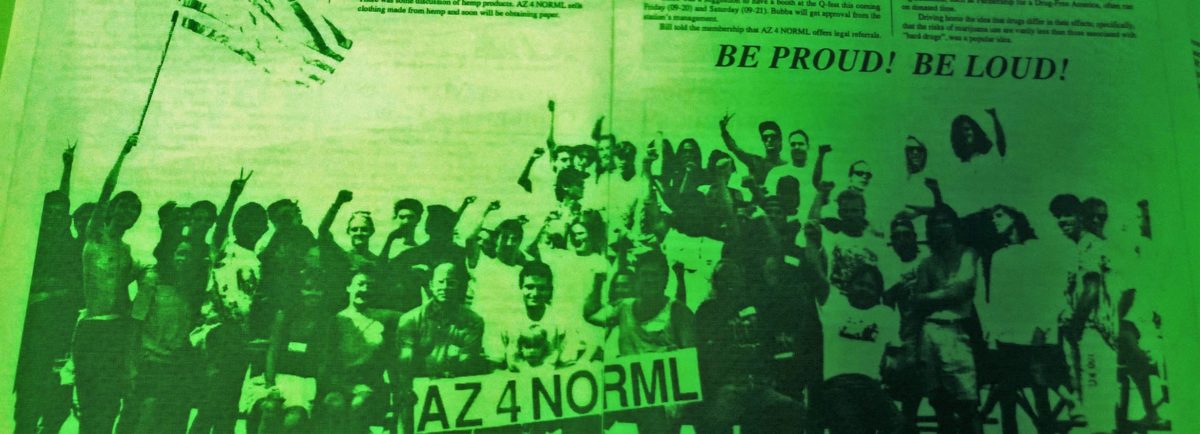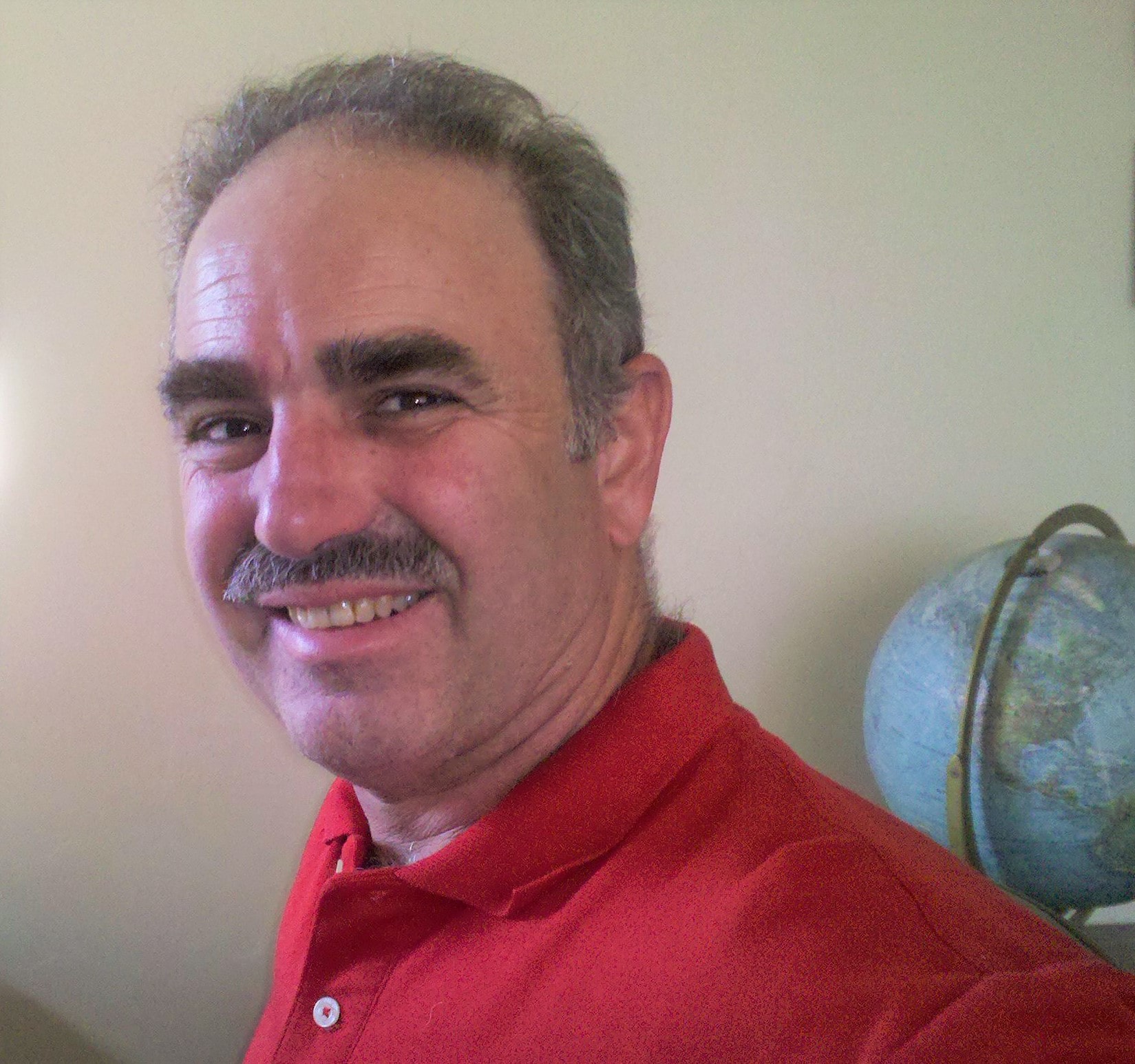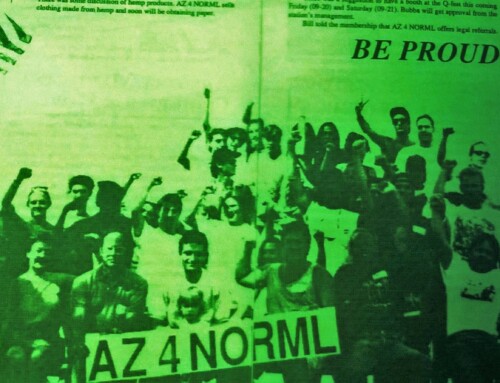The Unofficial History of AZ4NORML – Part 2

Those who won’t remember the past are doomed to repeat it. In the 1990s, Peter Wilson gave it his all to legalize pot in Arizona. The state responded by trying to blackmail him with 20 years to life without possibility of parole. He survived, but the movement died, until rising from the ashes like a phoenix in the naughts. This is the saga of why and how–Peter Wilson
A Kingpin is Born
“Kingpin” became the new Drug War catchword after “drug pusher” became passé. “We are going after the kingpins,” we were told…unless they were Republic insiders, it turns out.
Drug War critics in the 1980s had pointed out that 98% of the “drug pushers” busted for drugs were either street people carrying minuscule quantities, or “mules,” peons in the business, easily replaced. Now, came the homily from our leaders, the DEA would go after the organizers of organized crime, those reaping the big profits but avoiding jail. The “kingpins” were staying one step ahead of the law by “staying clean,” being the brains and financiers of the operations, but never handling the stuff themselves. Many of the kingpins did not even use drugs, we were told. Furthermore, accusations were afloat that in those rare instances when Big Guys were caught, they would avoid jail by ratting out their underlings. No more. Now the DEA was after the kingpins. And they let everybody know.
Mandatory minimums were the new tool used to implement the new strategy. Small-time dealers, now facing draconian sentences, would be offered leniency for turning in their bosses. And so it would go, up the chain-of-command, until the kingpin was taken down. In this way, an entire drug ring could be taken out, not merely one of its parts. Kingpins would no longer rein immune. But if you think the law plays by the rules, think again. Walter McKay, Arizona’s marijuana kingpin at the time, did rein immune. No one had ever grown as much pot in Arizona as Walter McKay.
Publicly McKay, a former White House aide in the Reagan administration, wore the guise of “gentleman farmer.” He owned farmland in Arizona, but did not sit on a tractor. He paid people to work his fields. He also did side-work in security, moonlighting as a reserve deputy for the Maricopa County Sheriff’s office. At some point, his farms were losing money. He saw an opportunity to turn that around, and he took it. He hired expert pot cultivator Jerry Cedar, and several of his associates, who had mastered the art in Northern California. McKay brought them to Arizona, to live on his farm in Eloy and grow pot. And that’s what they did for five or six years.
Tackling the problem of cover, they quickly discovered that vineyards were the perfect invisibility cloak for outdoor pot cultivation. All they had to do, when the plants grew as tall as the vines, was bend them over, tie them to the wire already in place, forcing them to grow along the grapevine. From the ground, they could not be seen. From the air, it was impossible to distinguish pot-green from vine-green. They got full sun, full irrigation, were fully invisible to the eyes of the law, and produced some full-flavored bud.
With the perfect cover, lots of vineyards and all the labor they needed, the operation quickly grew to about two dozen people. Money poured in, primo herb “for testing” was always available, and life was good. Yet, the participants remained nervous, and, perhaps longing to return to California or their native Canada, the Cedars agreed with McKay that 1990 would be their last season. McKay had pocketed millions; the workers considerably less, but nonetheless richly by farm-work standards. And everybody involved might have gotten away with it…except the new DEA strategy “worked.”
A small-time dealer was busted near Tucson, and faced a long mandatory minimum. Did he want to cooperate with the authorities? He was not involved in McKay’s operation, so felt no allegiance to the participants, but he had heard about it “through the grapevine” (irony intended), and spilled the beans. He told them about McKay’s pot-growing operation in exchange for a guaranteed light sentence.
The DEA was thrilled with the tip. The lead agent on the case, after doing some investigation, went to U.S. Attorney Linda Akers’ office, proud of the catch.
“Linda, we got the kingpin!”
“Who? What kingpin?”
“Arizona’s pot kingpin. He’s been growing hundreds of pounds, year after year, right under our noses!”
“Ok, but who?”
“Walter McKay, good cop gone bad.”
“Walter McKay?” she asked, a dark look in her eye.
“Yeah, Linda. Why?”
“Well…he was an aide in the Reagan administration, and the federal judges he’ll face are Reagan appointees. He won‘t get a fair trial.”
“Excuse me?”
“How many people does he have working for him?”
“Twenty, twenty-five.”
“We need numbers, not publicity. If he can give us twenty felony drug cases to prosecute, he can walk.”
“Are you serious?”
“Absolutely. Arresting McKay would put us in an awkward position. Make sure McKay’s name stays out of papers. Paint someone else as the ring-leader. In the press release, just say the arrests were made based on information provided by an informant.”
“Yes, ma’am.”
Needless to say, the above conversation is based on supposition, but actions speak louder than words, and the above words encapsulate the actions of the federal prosecutors. They coddled Arizona’s drug kingpin, once caught, in a manner utterly at odds with the intent of the law. The feds kept his body out of jail and his name out of the papers, while arresting and prosecuting two dozen of his employees, and he got to keep all his illegal gains.We do not know why federal prosecutors did what they did. History only records their actions: once caught, the feds coddled McKay, Arizona’s drug kingpin, in a manner utterly at odds with the intent of the law.
And nobody knows if Jerry Cedar did something really bad in a former lifetime, but fate was not kind to him in this life. About the same time federal prosecutor arranged for kingpin McKay to walk, Jerry’s son was killed in an automobile accident in Los Angeles. He and his wife were living somewhat isolated lives on the vineyard/pot-farm. There were no cell-phones back then. Somehow McKay, who lived in Phoenix, got the news first, and when McKay finally reached Jerry on the phone, he gave him the old good-news/bad-news routine:
“What’s the bad news?”
“You’re son was just killed in an automobile accident.”
After recovering from the shock, Jerry asked Walter about the good news.
“Already got airline tickets for you and Janice, and a rental car prepaid at the other end, so you can get there right away and take care of business. Pack your bags and drive the Caddy up here as quick as you can.”
“Alright, thanks Walt. Will do.”
“Oh, and Jerry?”
“Yeah?”
“Can you do me a favor?”
“What’s that?”
“I hate to ask at a time like this, but I need to take care of a big customer here in town.”
“And?”
“Can you put 60 pounds in the trunk? I’ll meet you at Sky Harbor and take the car from there.”
“Alright.”
But when Jerry and his wife met McKay at the airport and got out of the car, McKay had federal agents with him, not airline tickets. They slapped handcuffs on the couple, announcing they were being arrested for suspicion of transportation of marijuana; executed the search warrant; found the 60 pounds in the trunk; then read them their rights. McKay’s last word to them was, “Sorry.” They didn’t get to bury their son, and neither Cedar tasted life outside a jail cell for many years.
For nearly a century, the “liberal media” has acted like the propaganda branch of the government, repeating the Reefer Madness lies verbatim… and often. A recent case-in-point: the big “heart-attack study.” Researchers followed 200 middle-age men, matched as closely as possible in terms of race and socioeconomic standing, for 10 years. The 100 men in the control-group had 21 heart-attacks; the 100 marijuana users in the experimental group had 7. That’s a 3-to-1 reduction in heart-attack occurrence. So what was the headline? “Marijuana Associated with Heart Attacks.” Huh? The “scientists” conducting the study had spun the 3-to-1 reduction in heart-attacks into an “association,” and that’s what the press trumpeted on the front-page! No mention anywhere in the article that the “association” is a 3-to-1 reduction in heart-attack occurrence, and that researchers were willfully distorting the results. The press reports the puppet-show; not the puppeteers.
In an exception-that-proves the rule, a reporter for the Phoenix Gazette uncovered the McKay cover-up in a story that ran March 7, 1993. His editors, however, changed the headline from “Above the Law” to “Above Suspicion.” McKay was portrayed as the Bad Guy…The End. The story barely made ripples. No news investigator ever asked the U.S. Attorney’s office why, when the DEA finally caught an actual kingpin, prosecutors let said kingpin walk? No DEA administrator ever had to dodge questions about why, with all the asset-forfeiture laws Congress had put in place, Arizona’s marijuana kingpin was allowed to keep all his assets? Millions in cash, every square foot of the property he used to “manufacture” the drugs, and all the vehicles used to transport them, including the Caddy?
The Democrats could have jumped on the Republican hypocrisy, but instead gave tacit approval by ignoring it. Instead of being rewarded for his work, Alfredo Azula, the City & State reporter who did the investigation and wrote the story, was demoted to the Home and Garden section of the paper. U.S. Attorney Linda Akers, who oversaw McKay’s cover-up, became a Superior Court judge. Jerry Cedar, the man framed for McKay‘s crime, spent more time in the American Gulag than Aleksandr Solzhenitsyn did in the Soviet one, but never got to write a book about it. The only thing that changed is the term “kingpin” fell into disuse after the DEA caught their first real kingpin, then immediately released him, because the kingpin turned out to be a Republican insider. It was replaced by the more fearsome “drug cartels.”
But I’ve gotten ahead of the story …



